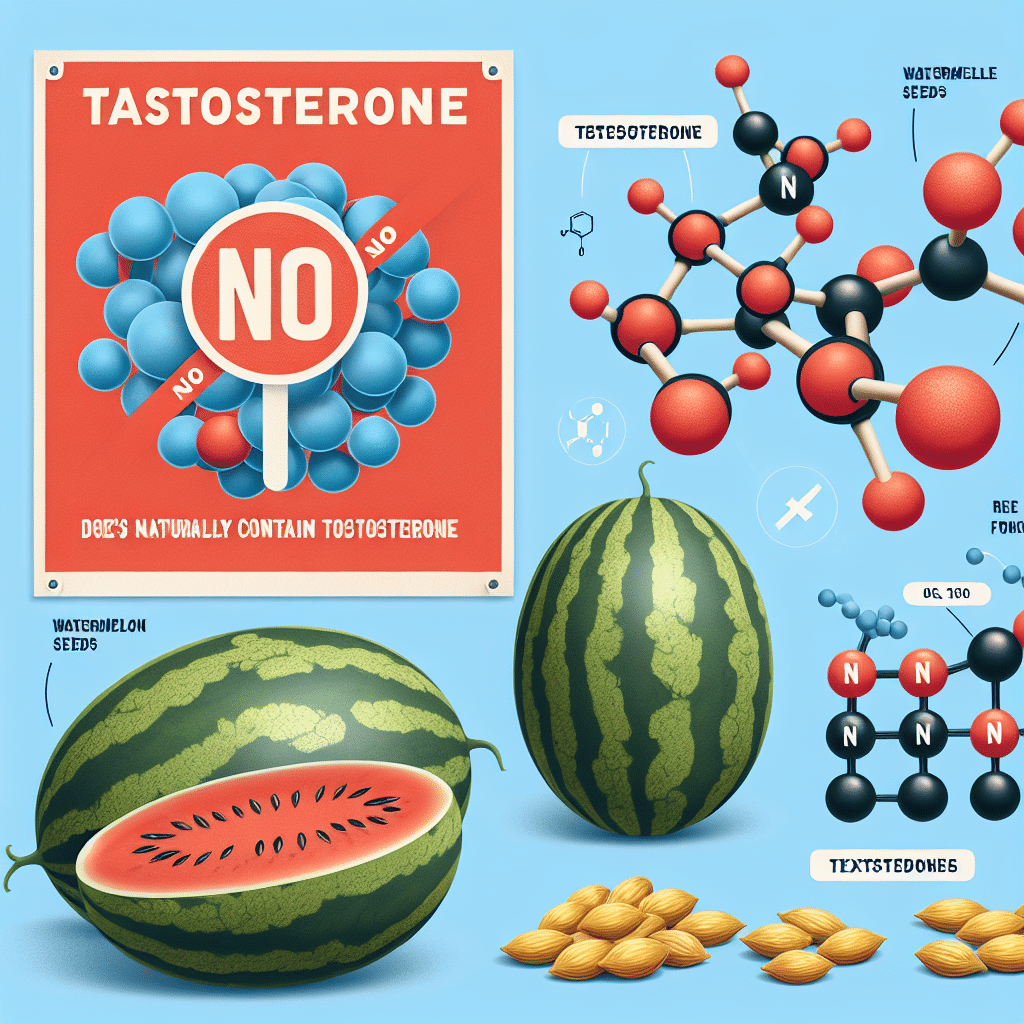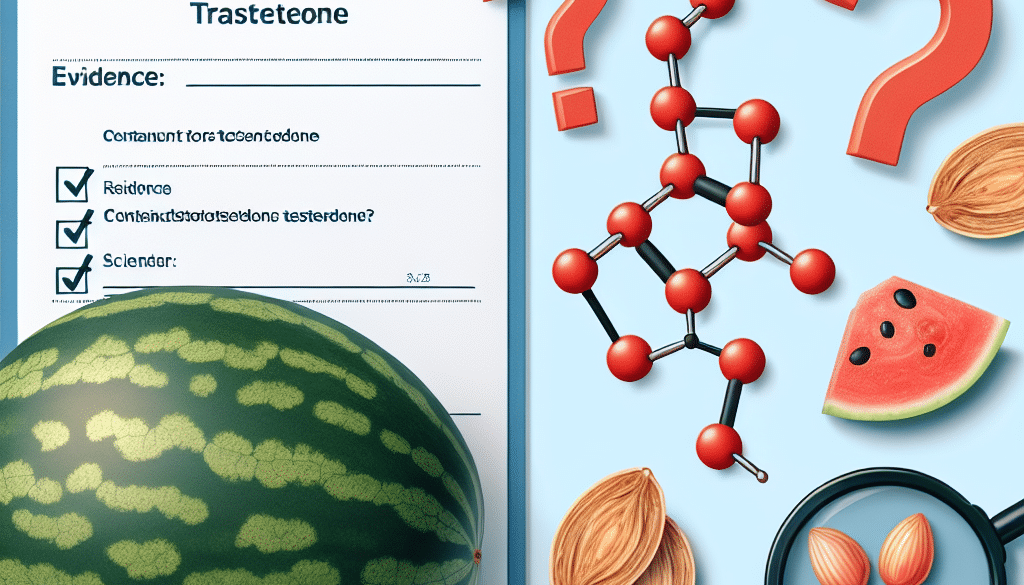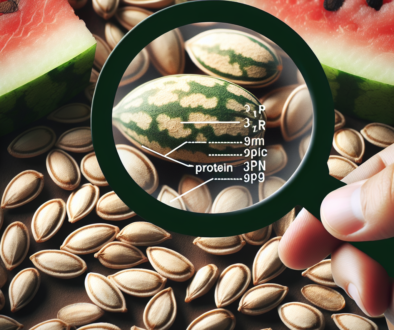Do Watermelon Seeds Have Testosterone?
-
Table of Contents
- Watermelon Seeds and Testosterone: Unveiling the Truth
- Understanding Testosterone and Its Importance
- Watermelon Seeds: Nutritional Powerhouses?
- Do Watermelon Seeds Contain Testosterone?
- The Link Between Nutrients in Watermelon Seeds and Testosterone
- Zinc and Testosterone Production
- Magnesium and Hormonal Balance
- Healthy Fats and Hormone Production
- Research on Watermelon Seeds and Testosterone
- Other Health Benefits of Watermelon Seeds
- How to Incorporate Watermelon Seeds into Your Diet
- Conclusion: Watermelon Seeds and Their Role in Testosterone Levels
- Discover ETprotein’s Protein Products
Watermelon Seeds and Testosterone: Unveiling the Truth

Watermelon, a juicy and refreshing fruit, is a staple at summer picnics and barbecues. While we often focus on the sweet, hydrating flesh, the seeds are frequently discarded without a second thought. However, recent trends in health and nutrition have brought attention to these tiny seeds, raising questions about their potential health benefits, including their impact on testosterone levels. This article delves into the science behind watermelon seeds and their relationship with testosterone, providing a comprehensive look at what the research says.
Understanding Testosterone and Its Importance
Testosterone is a crucial hormone in the human body, playing a vital role in various physiological processes. It is primarily known for its impact on sexual health, muscle mass, bone density, and overall well-being. Both men and women produce testosterone, but men have significantly higher levels. Maintaining optimal testosterone levels is essential for health and quality of life.
Watermelon Seeds: Nutritional Powerhouses?
Watermelon seeds are often overlooked, but they are packed with nutrients. They contain essential amino acids, vitamins, minerals, and antioxidants. These seeds are also a good source of healthy fats, including omega-3 and omega-6 fatty acids. The nutritional profile of watermelon seeds suggests they could have various health benefits.
- Protein content
- Vitamin B complex
- Magnesium and zinc
- Antioxidant properties
Do Watermelon Seeds Contain Testosterone?
The direct answer to whether watermelon seeds contain testosterone is no; they do not have testosterone in them. However, the question of interest is whether the nutrients within these seeds can influence testosterone levels in the body.
The Link Between Nutrients in Watermelon Seeds and Testosterone
While watermelon seeds do not contain testosterone, certain nutrients found in them are associated with the production and regulation of this hormone.
Zinc and Testosterone Production
Zinc is a mineral that plays a critical role in testosterone production. It is an essential component of various enzymes and is involved in the synthesis of testosterone. Studies have shown that zinc deficiency can lead to reduced testosterone levels. Watermelon seeds are a good source of zinc, which suggests they could support testosterone production.
Magnesium and Hormonal Balance
Magnesium is another mineral found in watermelon seeds that is important for maintaining hormonal balance. It has been linked to increased testosterone levels, especially when combined with regular exercise. Magnesium also contributes to better sleep, which is crucial for optimal testosterone production.
Healthy Fats and Hormone Production
The healthy fats in watermelon seeds, including omega-3 and omega-6 fatty acids, are vital for hormone production. These fats are components of cell membranes and are involved in the creation of cholesterol, which is a precursor for testosterone and other hormones.
Research on Watermelon Seeds and Testosterone
While there is a theoretical basis for the nutrients in watermelon seeds to support testosterone levels, research specifically on watermelon seeds and testosterone is limited. Most studies focus on the individual nutrients rather than the seeds themselves. However, the overall nutritional profile of watermelon seeds suggests they could contribute to a diet that supports healthy testosterone levels.
Other Health Benefits of Watermelon Seeds
Beyond their potential impact on testosterone, watermelon seeds offer other health benefits:
- They are a rich source of protein, which is essential for muscle repair and growth.
- Their antioxidant properties can help combat oxidative stress and inflammation.
- Watermelon seeds contain dietary fiber, which aids in digestion and promotes gut health.
- The B vitamins in watermelon seeds are important for energy metabolism and brain function.
How to Incorporate Watermelon Seeds into Your Diet
To reap the benefits of watermelon seeds, you can consume them in various ways:
- Roasted as a snack
- Ground into flour for baking
- Blended into smoothies
- Sprinkled on salads or yogurt
Conclusion: Watermelon Seeds and Their Role in Testosterone Levels
In conclusion, while watermelon seeds do not contain testosterone, their rich nutrient profile, including zinc, magnesium, and healthy fats, may support the body’s natural testosterone production. Incorporating watermelon seeds into a balanced diet could contribute to overall health and well-being. However, more research is needed to fully understand their direct impact on testosterone levels.
Discover ETprotein’s Protein Products
If you’re looking to enhance your diet with high-quality protein sources, consider ETprotein’s range of organic bulk vegan proteins. Their watermelon seed protein is an excellent choice for those seeking a plant-based option that supports a healthy lifestyle. ETprotein’s products are non-GMO, allergen-free, and characterized by a neutral taste, making them a versatile addition to any diet.
About ETprotein:
ETprotein, a reputable protein and L-(+)-Ergothioneine (EGT) Chinese factory manufacturer and supplier, is renowned for producing, stocking, exporting, and delivering the highest quality organic bulk vegan proteins and L-(+)-Ergothioneine. They include Organic rice protein, clear rice protein, pea protein, clear pea protein, watermelon seed protein, pumpkin seed protein, sunflower seed protein, mung bean protein, peanut protein, and L-(+)-Ergothioneine EGT Pharmaceutical grade, L-(+)-Ergothioneine EGT food grade, L-(+)-Ergothioneine EGT cosmetic grade, L-(+)-Ergothioneine EGT reference grade and L-(+)-Ergothioneine EGT standard. Their offerings, characterized by a neutral taste, non-GMO, allergen-free attributes, with L-(+)-Ergothioneine purity over 98%, 99%, cater to a diverse range of industries. They serve nutraceutical, pharmaceutical, cosmeceutical, veterinary, as well as food and beverage finished product distributors, traders, and manufacturers across Europe, USA, Canada, Australia, Thailand, Japan, Korea, Brazil, and Chile, among others.
ETprotein specialization includes exporting and delivering tailor-made protein powder and finished nutritional supplements. Their extensive product range covers sectors like Food and Beverage, Sports Nutrition, Weight Management, Dietary Supplements, Health and Wellness Products, and Infant Formula, ensuring comprehensive solutions to meet all your protein needs.
As a trusted company by leading global food and beverage brands and Fortune 500 companies, ETprotein reinforces China’s reputation in the global arena. For more information or to sample their products, please contact them and email sales(at)ETprotein.com today.












